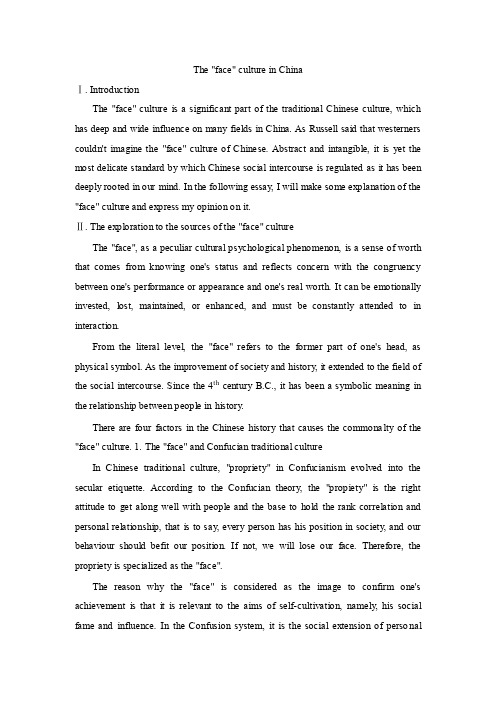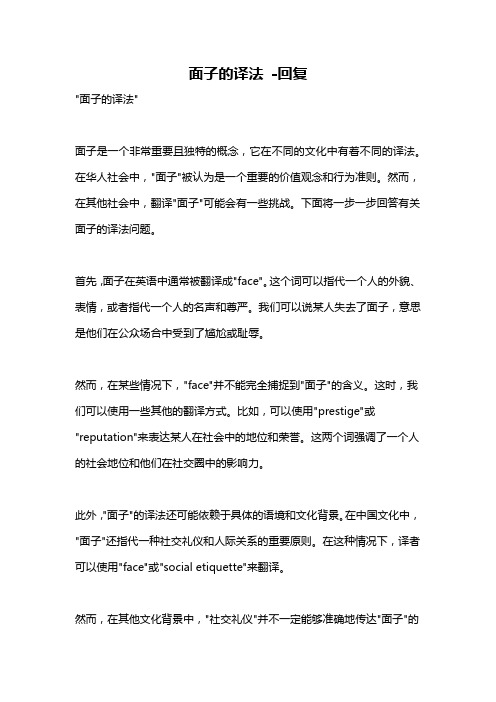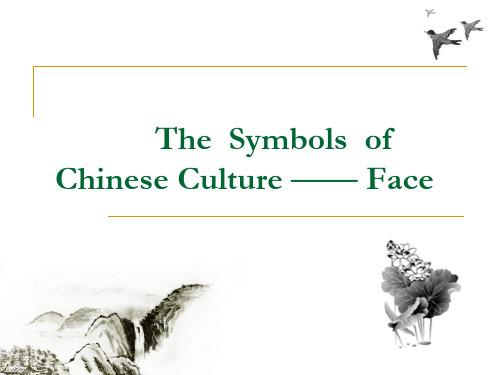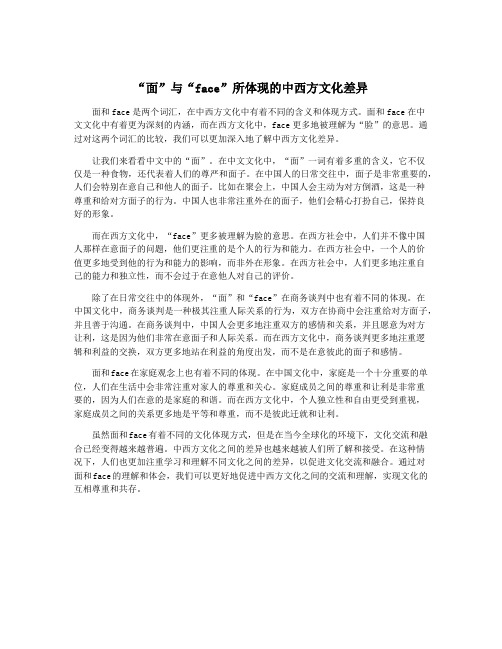face 面子文化(英文)
中国面子文化论文

The "face" culture in ChinaⅠ. IntroductionThe "face" culture is a significant part of the traditional Chinese culture, which has deep and wide influence on many fields in China. As Russell said that westerners couldn't imagine the "face" culture of Chinese. Abstract and intangible, it is yet the most delicate standard by which Chinese social intercourse is regulated as it has been deeply rooted in our mind. In the following essay, I will make some explanation of the "face" culture and express my opinion on it.Ⅱ. The exploration to the sources of the "face" cultureThe "face", as a peculiar cultural psychological phenomenon, is a sense of worth that comes from knowing one's status and reflects concern with the congruency between one's performance or appearance and one's real worth. It can be emotionally invested, lost, maintained, or enhanced, and must be constantly attended to in interaction.From the literal level, the "face" refers to the former part of one's head, as physical symbol. As the improvement of society and history, it extended to the field of the social intercourse. Since the 4th century B.C., it has been a symbolic meaning in the relationship between people in history.There are four factors in the Chinese history that causes the commona lty of the "face" culture. 1. The "face" and Confucian traditional cultureIn Chinese traditional culture, "propriety" in Confucianism evolved into the secular etiquette. According to the Confucian theory, the "propiety" is the right attitude to get along well with people and the base to hold the rank correlation and personal relationship, that is to say, every person has his position in society, and our behaviour should befit our position. If not, we will lose our face. Therefore, the propriety is specialized as the "face".The reason why the "face" is considered as the image to confirm one's achievement is that it is relevant to the aims of self-cultivation, namely, his social fame and influence. In the Confusion system, it is the social extension of perso nalethics. The "face" culture is influenced by the ancient Confucianism.2.The "face" and the shame-based cultureIn the sense of shame, people attach importance to the "face". The feeling of guilt is to judge the things whether conform to one's principles rather than the things themselves by self-examination. However, the pure "shame" is to pay more attention to the reactions of other people, which surrender the tendency of principle-based judgement.In China, the shame in their mind is not only the shame caused by others' ridicule or awareness(the social "face"), but also the self-discipline(the moral "face"). The shame is an essential mechanism to control one's emotions and thoughts. In the socialism of the Chinese, we always are required not to lose their face by our precedents. All of these promote the formation of the "face" culture.3.The "face" and social orientationThere are four orientations in the social orientations, including family orientation, relation orientation, authority orientation and other orientation in the context of family orientation, Chinese tend to emphasis on the collectivism rather than individualism in western countries. Relation orientation refers that to keep harmony in contact with others, the person endeavor to do what others expect to save their face and avoid the conflict. Authority orientation is a kind of behaviour orientation to respect the higher rank in history. The other orientation means that Chinese pay most attention to other people's opinion, standard and evaluation on them. All these orientations have great influence on the Chinese. They show that to save others' face is equivalent to save oneself's face to conform to collectivism.4.The "face" and the ways of the world.As a kind of resource to contact with people, is the social norm to get along well with each other for Chinese. There are two kinds of social behaviour: firstly, people deal with the relationship with others by giving gifts, greetings or visits; secondly, while the person in our relationship web suffers from hardship, we have the sympathy for him or her. "Courtesy calls for reciprocity", that is the plain performance of theChinese "face" culture.Ⅲ. The typical examples of the "face" cultureIn the Spring and Autumn period, Y an ying was appointed as ambassador to the State of Chu. When the king of the Chu was so informed, he wanted to humiliate him. While he was across the gate of the palace, he was asked to cross the smaller gate next to the bigger one in the excuse of his shorty and he rejected implicitly by saying,"I only cross the dog door while I am sent on a diplomatic mission to the dog country." His smart utterance dealt with the awkward position and gained the respect from others, which was also a way of saving his face, even his nation's face."What man was ever immune from death? Let me but leave a loyal heart shining in the pages of history" this was a famous saying of our national hero Wen Tianxiang. In the most dangerous period of our country, he took the nation's benefit as the highest goal. Even the thought of surrender had spread at court, he insisted the independence of the authority at any time. He faced execution bravely and got his deserved honor. He is a positive model of Chinese people's "face" culture, which could also be understood as self-respect.The overlord in the West Chu Period Xiang Yu was a typical Chinese who pay most attention to the "face". Even though he made all his efforts to hold his field, Liu Bang took the upper hand and pushed him to the verge of total failure. W hile he was in dilemma in the bank of Wu Jiang river, he rejected the fisherman's beg to cross the river by his little boat, saying that he was too ashamed to go back to see his countrymen. There is no wonder that he was a person who takes his "face" as his whole life. If he had creep as well as soar, there would have had another history.Ah Q, the well-known character written by Lu Xun, is the prototype of many Chinese people.One spring, while he was walking along in a state of happy intoxication, he saw Whiskers Wang sitting stripped to the waist in the sunlight,catching lice. Ah Q sat beside him and had a long search yielded only three or four lice. However, he felt disappointed, then resentful: the despicable Whiskers Wang could catch so manywhile he himself had caught so few -- what a great loss of face!There is no wonder he is the typical person of the bad side of the "face" culture in China.The most remarkable event in the Chinese culture is Beijing Olympic Games. What impressed us most was the grant opening ceremony of Beijing Olympic Games. Even though we enjoyed the great performance it offered to us, even the world, many western critics held that whole ceremony was too pomp and cost too much money, which should resulted from our "face" culture.All of these above show the preference to the "face" in the Chines culture. The "face" is connected with many aspects, such as personality or position. To save face, he would get respect from others and also conform to his own principles. He might lose his career, even his life and fame. Whatever they get or lose, Chinese hold the "face" at very important place all the time, forming the Chinese peculiar "face" culture.Ⅳ. The influence of the "face" cultureThe "face" culture has its social functions. A person gets the respect and admiration from the society by his talents or endeavor, which means he gains his deserved face. The individual acts by conforming to his position to join in the social activities and that is helpful to build up the right etiquette. Besides, Chinese make full use of the "face" in social interaction. It can be used as a exchangeable resource and we are able to build up our social relation by giving or taking the "face".Also, to some extent, it promotes the harmony in humans' relationship. The "face" culture affects the ways to deal with social relationship in a positive way among the Chinese.However, the Chinese tend to emphasize the external patterns rather than the internal entity under the influence of the "face" culture."We must choose the best position, employ the French designer, …" all of these are the testimony of our "face" concept. What's more, it may contribute to the growth of those unhealthy practices, such as corruption. The more power a person has pr the richer the person is, his social relationship is more complicated. As a result, he takes the upper hand in socialinteraction and gained more position, wealth and "face", which is unfair to other social members. Also, he gains his face on the expense of his own life values.Therefore, it is very important to have a right attitude toward the "face" culture. Only we take it in the right position can it be beneficial to us.Ⅴ. Conclusion:The "face" culture originated from the ancient times. Its emergency and development are influenced by the Chinese culture and in reverse, it forms the peculiar part of Chinese culture. Not only the celebrities but also the average Chinese deal with the social interaction by the "face" principle consciously or unconsciously, which is a typical Chinese psychological phenomenon. We may get or lose our face during our life but do not forget to have right attitude to it so that we could really gain our face.。
面子的译法 -回复

面子的译法-回复"面子的译法"面子是一个非常重要且独特的概念,它在不同的文化中有着不同的译法。
在华人社会中,"面子"被认为是一个重要的价值观念和行为准则。
然而,在其他社会中,翻译"面子"可能会有一些挑战。
下面将一步一步回答有关面子的译法问题。
首先,面子在英语中通常被翻译成"face"。
这个词可以指代一个人的外貌、表情,或者指代一个人的名声和尊严。
我们可以说某人失去了面子,意思是他们在公众场合中受到了尴尬或耻辱。
然而,在某些情况下,"face"并不能完全捕捉到"面子"的含义。
这时,我们可以使用一些其他的翻译方式。
比如,可以使用"prestige"或"reputation"来表达某人在社会中的地位和荣誉。
这两个词强调了一个人的社会地位和他们在社交圈中的影响力。
此外,"面子"的译法还可能依赖于具体的语境和文化背景。
在中国文化中,"面子"还指代一种社交礼仪和人际关系的重要原则。
在这种情况下,译者可以使用"face"或"social etiquette"来翻译。
然而,在其他文化背景中,"社交礼仪"并不一定能够准确地传达"面子"的意义。
这时,我们可以使用"self-esteem"或"pride"来表达一个人对自己的尊严和自尊心的看重。
总结起来,面子的译法可以根据具体的语境和文化背景而有所不同。
一般来说,"face"是一个较为通用的翻译方式,能够涵盖"面子"的外貌、声望和尊严等含义。
然而,在一些特定的情况下,我们可能需要使用其他的词汇来更好地传达"面子"的意义。
中国面子文化.解析

lead
When we think of cultural differences, the most important thing that comes to mind is the Chinese concept of "Face“. it's also one of the most important concepts in understanding the Chinese Mind .
WESTERN FACE
Unlike “Western face”– which is more self-oriented and individualistic — Chinese face is more other-directed and relational.
As a general sociological statement, Western cultures tend to focus on the individual as an independent, selfreliant being.
In raising children, the focus is on helping them develop a strong sense of personal integrity and individuality.
CHINESE FACE
In contrast, for some 4,000 years, Chinese culture has downplayed concept of the individual—instead emphasizing the supremacy of the family and group.
“面”与“face”所体现的中西方文化差异

“面”与“face”所体现的中西方文化差异面和face是两个词汇,在中西方文化中有着不同的含义和体现方式。
面和face在中文文化中有着更为深刻的内涵,而在西方文化中,face更多地被理解为“脸”的意思。
通过对这两个词汇的比较,我们可以更加深入地了解中西方文化差异。
让我们来看看中文中的“面”。
在中文文化中,“面”一词有着多重的含义,它不仅仅是一种食物,还代表着人们的尊严和面子。
在中国人的日常交往中,面子是非常重要的,人们会特别在意自己和他人的面子。
比如在聚会上,中国人会主动为对方倒酒,这是一种尊重和给对方面子的行为。
中国人也非常注重外在的面子,他们会精心打扮自己,保持良好的形象。
而在西方文化中,“face”更多被理解为脸的意思。
在西方社会中,人们并不像中国人那样在意面子的问题,他们更注重的是个人的行为和能力。
在西方社会中,一个人的价值更多地受到他的行为和能力的影响,而非外在形象。
在西方社会中,人们更多地注重自己的能力和独立性,而不会过于在意他人对自己的评价。
除了在日常交往中的体现外,“面”和“face”在商务谈判中也有着不同的体现。
在中国文化中,商务谈判是一种极其注重人际关系的行为,双方在协商中会注重给对方面子,并且善于沟通。
在商务谈判中,中国人会更多地注重双方的感情和关系,并且愿意为对方让利,这是因为他们非常在意面子和人际关系。
而在西方文化中,商务谈判更多地注重逻辑和利益的交换,双方更多地站在利益的角度出发,而不是在意彼此的面子和感情。
面和face在家庭观念上也有着不同的体现。
在中国文化中,家庭是一个十分重要的单位,人们在生活中会非常注重对家人的尊重和关心。
家庭成员之间的尊重和让利是非常重要的,因为人们在意的是家庭的和谐。
而在西方文化中,个人独立性和自由更受到重视,家庭成员之间的关系更多地是平等和尊重,而不是彼此迁就和让利。
虽然面和face有着不同的文化体现方式,但是在当今全球化的环境下,文化交流和融合已经变得越来越普遍。
“面”与“face”所体现的中西方文化差异

“面”与“face”所体现的中西方文化差异面与face在中西方文化中有着不同的体现,这种差异常常代表着不同文化的观念和价值观,下面我们来探讨一下这种差异。
让我们从中文的“面”开始谈起。
在中国文化中,“面”是非常重要的,它代表着一个人的尊严和荣誉。
拥有面子意味着一个人在社会上的地位和尊重。
在中国,人们经常会以“面子”来衡量一个人的价值,比如对于家庭而言,孩子的成绩、工作的稳定与否都与家庭的面子有关。
“给面子”也是非常重要的,表示尊重和体贴,比如在餐桌上,“给面子”意味着不会在客人面前挑食或者拒绝对方的好意。
这种“面”的概念在中国文化中是非常重要的,影响着人们的行为和社交关系。
相比之下,在西方文化中,“face”并不具有同样的重要性。
在英文中,“face”通常被理解为一个人的外貌或者面部表情,而不是一个人的尊严和荣誉。
在西方社会中,人们更加注重个人自由和独立,对于他人的眼光和评价并不在意。
在西方文化中,人们更多地侧重于个人的真实内在品质,而不是外部表现。
这也体现了西方文化中强调的个人主义和自我表达的价值观。
面与face在中西方文化中的表达方式也有所不同。
比如在中国的社交场合中,人们会在面对面的交流中注重言辞的细腻和委婉,以及对他人的尊重和体贴。
在传统的中国礼仪和文化中,人们更倾向于暗示和留有余地,不直接表达对他人的负面评价或者不满意。
这种“留有面子”的方式在交际中是非常重要的,可以维护人际关系和社会和谐。
而在西方文化中,人们更加直接和坦率,注重个人的真实表达和对事实的描述。
在面对问题或者不满时,人们更倾向于直言不讳,而不会回避或者委婉地表达。
在西方社交场合中,人们更注重个人的真实性和直接性,而不是留有余地或者顾忌对方的感受。
这种直接的表达方式也体现了西方文化中对于个人自由和真实性的追求。
旅游消费者行为(第十二章 文化)

• (3)适应与不适应阶段:与新文化的适应,意味着固有文化与新文化的融和,必然产生思想 上与行为上的协调。当旅游结束,旅游者返回自己的故乡(即回到自己原有的文化环境中),自身 融入的新的文化将与母体文化再次冲击,使人产生“再次入侵”的不适感。
(2)不确定性的规避是指某一个社会成员感受到的不确定性和模糊状态的威胁程 度。
(3)个人主义和集体主义是衡量某一社会总体是关注个人的利益还是关注集体的 利益。
(4)男性主义与女性主义是指社会中男性价值观占优势的程度,或者说人们更强 调事业成功还是生活质量。
(5)长期取向与短期取向是指一个社会对长期利益和近期利益的价值观。长期取 向的文化关注未来,重视节俭和毅力。
本章小结
(5)文化差异是指人们在不同的环境下形成的一个民族独特的心理感情、民族意识 和文化氛围,从而表现在语言、知识、人生价值观、道德观、思维方式、风俗习惯 等方面的不同。 (6)衡量文化差异衡量不同国家文化差异的一个有效的框架就是霍夫斯泰德提出权 力距离、不确定性的规避、个人主义和集体主义、男性化与女性化、长期取向与短 期取向这五个维度。 (7)文化价值观,是指为社会的大多数成员所信奉,被认为是社会所普遍倡导的信 念。从比较广泛的意义上可以将文化价值观分为三种形式,即他人导向的价值观、 环境导向的价值观和自我导向的价值观。
学习目标
• 掌握文化的概念与特征、亚文化的概念与类型 • 掌握文化价值观的概念,了解文化价值的三种形式 • 熟悉中国传统文化的基本精神 • 了解中国传统文化对旅游消费者行为的影响 • 熟悉中国旅游消费者的面子结构和面子文化在旅游消费行为中的表现 • 了解面子文化对旅游消费行为的影响
中国面子文化英文作文

中国面子文化英文作文China's "face culture" is a big deal. It's all about saving face, giving face, and not losing face. In Chinese society, it's important to maintain a good reputation and avoid embarrassment at all costs. This can lead to a lot of indirect communication and saving face in public, even ifit means not addressing issues directly.In China, giving face to others is a way of showing respect and maintaining harmony. It's about giving someone the opportunity to maintain their dignity and reputation, even if it means going out of your way to do so. It's a way of acknowledging someone's status and showing that you value their position in society.Losing face is a big fear in Chinese culture. It's about feeling embarrassed or humiliated in front of others, and it can have serious consequences for social and professional relationships. People will go to great lengths to avoid losing face, even if it means not speaking up oraddressing important issues.Face is also closely tied to hierarchy and social status in China. People are often judged by their reputation and social standing, and it can impact their opportunities for employment, relationships, and social connections. Maintaining a good reputation and giving face to others is a way of navigating these social hierarchies and showing respect for those in higher positions.In Chinese culture, face is not just about individual reputation, but also about the reputation of one's family, company, or social group. This means that people will often act in ways that reflect positively on their family or organization, even if it means sacrificing their own personal desires or needs.In conclusion, "face culture" is a complex and important aspect of Chinese society. It impacts communication, relationships, and social interactions in significant ways, and it's important to understand andrespect these cultural norms when interacting with Chinese individuals and communities.。
文化负载词在四级考试汉译英中的翻译

文化负载词在四级考试汉译英中的翻译
文化负载词(cultural loaded words)指文化中包含着特定的意义和价值观念的词汇。
在四级考试中,汉译英的翻译中经常会遇到文化负载词,这些词汇的翻译不仅仅是直接转译,更需要考虑其背后的文化含义和价值观念。
下面将结合具体例子来介绍文化负载词在四级考试汉译英翻译中的翻译方法。
1. 面子(mianzi)
在中国文化中,“面子”是一种重要的价值观念,常常被用来描述个人形象和社会关系中的尊严和尊重。
当汉语中出现“面子”时,英语中可以使用“face”、“reputation”、“honour”等词进行翻译。
例如,“她一定要赢得这场比赛,否则会失去面子。
”可以翻译为“She must win the game, or she will lose face.”
3. 吉祥如意(jixiangruyi)
4. 孝顺(xiaoshun)
5. 革命(geming)
总之,在四级考试中遇到文化负载词时,要注意翻译的准确性和文化背景的理解。
只有这样才能在汉译英的翻译中准确表达文化含义和价值观念。
- 1、下载文档前请自行甄别文档内容的完整性,平台不提供额外的编辑、内容补充、找答案等附加服务。
- 2、"仅部分预览"的文档,不可在线预览部分如存在完整性等问题,可反馈申请退款(可完整预览的文档不适用该条件!)。
- 3、如文档侵犯您的权益,请联系客服反馈,我们会尽快为您处理(人工客服工作时间:9:00-18:30)。
Face "Face"By Shirley ZhangJust imagine , if you are very hungry , and a person throw a piece of bread to you scornfully , you will eat it or not ? I guess that most of you will choose not to eat it , as you have your self-esteem and reputation , which is much more important than your stomach . But , could i summarize it as you are keeping your face?Let's move to the theme—face . First , what is face? Face , a concept originating from Chinese culture , has plenty of connotations.In one aspect, face is an accumulation of praise and success. In other word, face means reputation. More reputation a person requires, more desire he wants to keep his face. Those who care about their reputation care about other's view very much, so when they are praised , they will feel grow face . Otherwise, they will suffer from loosing face. Everyone wants praise rather than criticism, so , face hides in every people's mind , and it sometimes shows the psychology of Chinese society.In other aspect , face work shows the subtle social relationship . It implies the personal mutual affection. For example , if one of your relative wants to have a position in your company, it is likely that you will accept his requirement. This means that you give him face. However , if you refused, your relative may feel embarrassed and heart-broken, and this could influence the relationship between your relative and you. This phenomenon is very common during our social daily life, though we can hardly accept it.All in all, "face" has seeped into our daily life and social culture.Today ,let's focus on the first aspect, and we can call it "the face-saving phenomenon". Some people view "face-saving" as a positive noun,while other people classify it as a negative noun. But for me , i view "face-saving" as a neutral noun. That is to say , suitable face-saving is acceptable.Most of people may wonder about the advantages of face-saving. In fact , those who care about their face have a strong sense of shame , so they will notice their behavior and abide by the law. In order to maintain their reputation .What's more ,you will be disgraced if you lose ,the most savage combative instincts are aroused. Everyone cares about face, so face-saving exits in everyone's mind. Therefore ,consider face-saving as a bad thing arbitrarily is unreasonable.when it comes its disadvantages, an old saying appears in my mind, which is "Gentility without ability is worse than plain beggary", that is to say , if you pay too much attention to face-saving, you will suffer a lot from it. For example, you may nurse a grievance or suffer from injustice , in that you don't want to loose face at any time. Secondly , "face" can bean excuse for not admitting mistakes. Some people think it would be no face to admit mistakes.thirdly, with the development of material living conditions. In many people's eyes, no money is considered as a loss of face, no famous-brand production is a loss of face. All of those view give rise to the inordinate vanity, and people tend to compare with the higher unrealistically.From all we have discussed above, we can conclude that the disadvantages of face-saving is mainly come from the over face-saving. Unfortunately, most of us is likely to over face-saving. So ,what kind of people tend to over face-saving?The first kind — people without confidence.An unsure—emotion person care about others' eyesight. They are afraid of being noticed and be embarrassed, so they try their best to not have any opportunities of losing face. Once they lose face, they think other people may not confirm their ability anymore .As for those people,in my opinion, they should improve their confidence and should be more brave. Don't be constrainted by others' eyesight. Only if you show yourself bravely, can you achieve a greater success . In a word, just try to forget your face.The second kind — people with high position or great power.Those people give us a image of leader. In their mind, face-saving may lead to the decline of prestige. Just for this reason, most of them are over face-saving.To those people, in my view,a leader can hardly achieve high prestige only from face-saving. The genuine heart for the service of the masses and the strict and serious work style can really give a leader high prestige.. For example, American president Reagan often make laughters before the public ,and he is the most humous president in American history. We even can't count how many times he had lost his face. But , he also ranked highly in public opinion polls of U.S. Presidents. And he has a well-known saying : After making fool of yourself , you must be serious like an owl.The last kind — peacockThose people want to have a good reputation, while they are going in the wrong direction. They mistakenly believed that being rich means face-growing. So , they are happy to flaunt their wreath . They wear Armani , carry LV , use iphone , drive Ferrari ... Some people even tighten their belts to buy luxurious goods, in that they don't want to lose face in front of others . Just like in this situation : all people around you are using iphone , while you are still struggling against an old Nokia , which is really somewhat embarrassed . On the contrary , there is another group of people , whose job is not so good . Some of them take the service to others as a shame or "self-missing" . I must give them an advise : Not sinking down , anchor will never work.Of course , there are other kinds of people , who is likely over face-saving. For my part , face-saving has nothing wrong with itself. So , let's try our best to remove its negative factors. Anyway , "face" has a deep influence on our society and culture in deed .As I mentioned before "face" has seeped into our daily life and social culture.。
